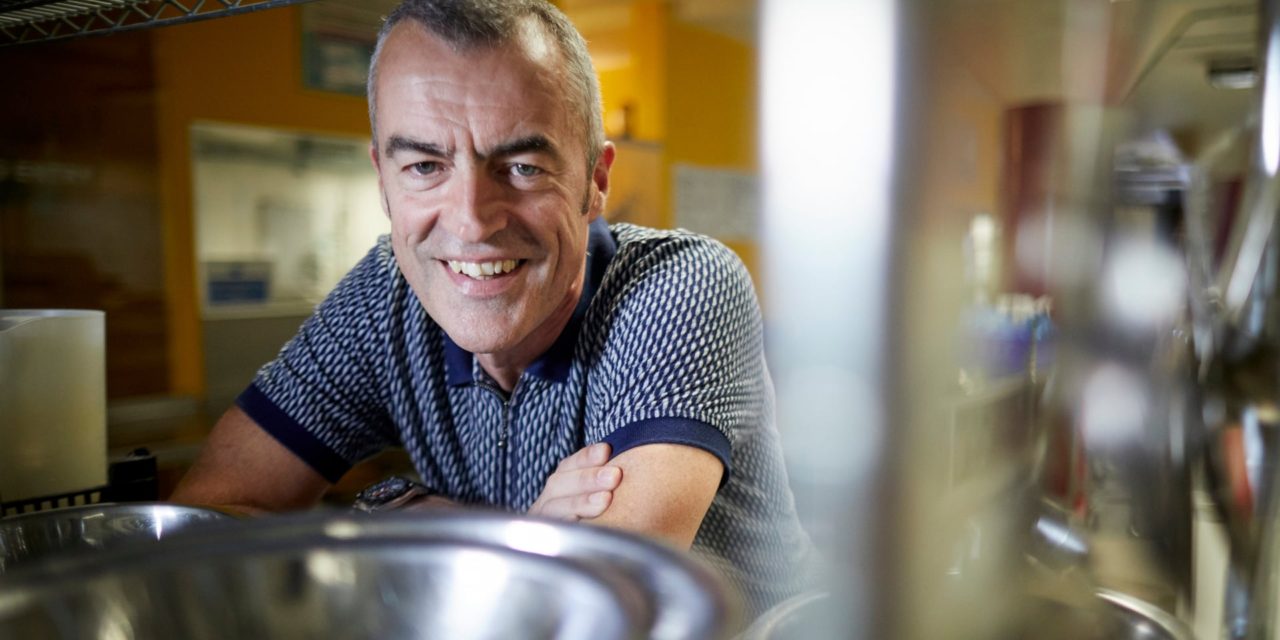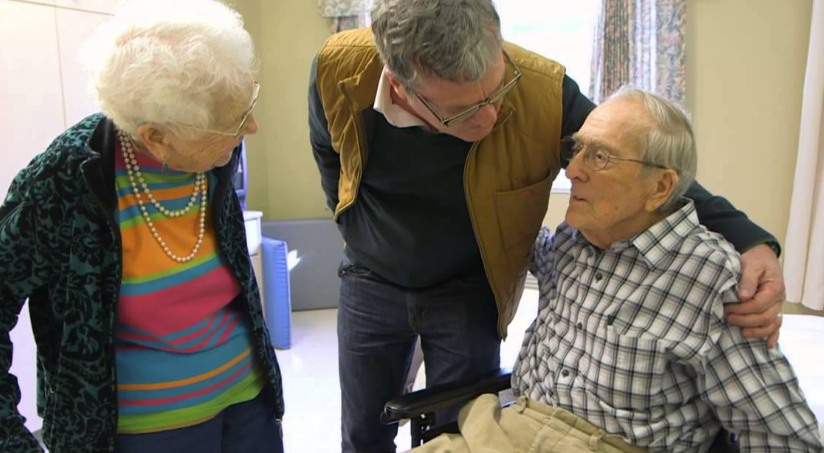Credit: The Guardian
Editor’s Note: Robbie Davison is the director of a food organization, Can Cook, based out of Liverpool and Merseyside. Their mission is simple: provide those in food poverty with the quality food they deserve. The organization provides those in need with the tools they need to eat right, and teaches them how to execute that need. Every week, Can Cook offers fresh, healthy food to schools, nurseries, care homes, and individuals, feeding thousands of hungry citizens.
This interview was conducted via e-mail.
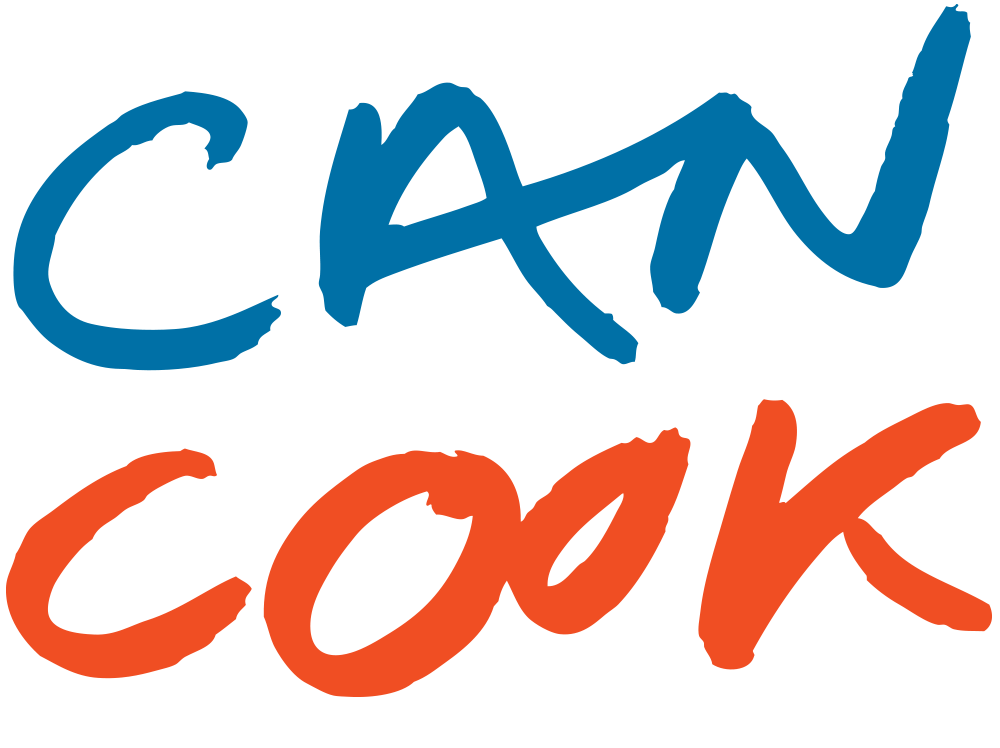
Credit: Can Cook
Developing Fresh Food For Those in Need
Sophia News: Please describe your evolution from food lover to advocate for quality cooking for those in need.
Robbie Davison: My food journey started in a café in the most deprived community in the UK. It was a café that had a passionate chef who wanted to feed people good food when their normal diet was processed. With the chef, we created cookery lessons and 11 years on we taught 15,000 people to cook. We realised that people were cooking less, because they had less, and with less their diets were becoming a real concern. The logical step-change for our social business approach was to include food production, and alongside create solutions to food poverty that treated hungry people with dignity by always feeding people well. This is the space Can Cook now occupies; creating meals to sell, and generating the resources through sales, and linked campaigns to make sure hungry people eat fresh meals they would choose for themselves.
SN: What made you realize the hunger epidemic in your country was something that you needed to address?
RD: As we were teaching people to cook, we realised that their food poverty was less about a lack of skills, and more to do with the lack of access to good food options— such as no local stores that sold fresh food, or local stores being too expensive. Moreover, the UK food aid system (now 10 years old) mirrored what has been in place in North America for decades – mostly processed food donated randomly by individuals as a gift or by corporations as food surplus. It has never worked in North America, so we thought, “How is it ever going to work in the UK?” 10 years in, it hasn’t.
Against a backdrop of poverty, 80% of hungry people in the UK never access the food aid system because of the stigma and the poor range of food offered. We set out to create a food aid system that could be organised to capture the 80%.
Our belief is that food is the most powerful medium there is, and used for good, solutions can be found to help people away from their poverty and into better times. Our working mantra is ‘if you feed people in need well, they are more likely to move away from their crisis. If you feed people badly, they will remain in their crisis’ – so fresh meals and food choice needs to be the cornerstone of any food aid offer.
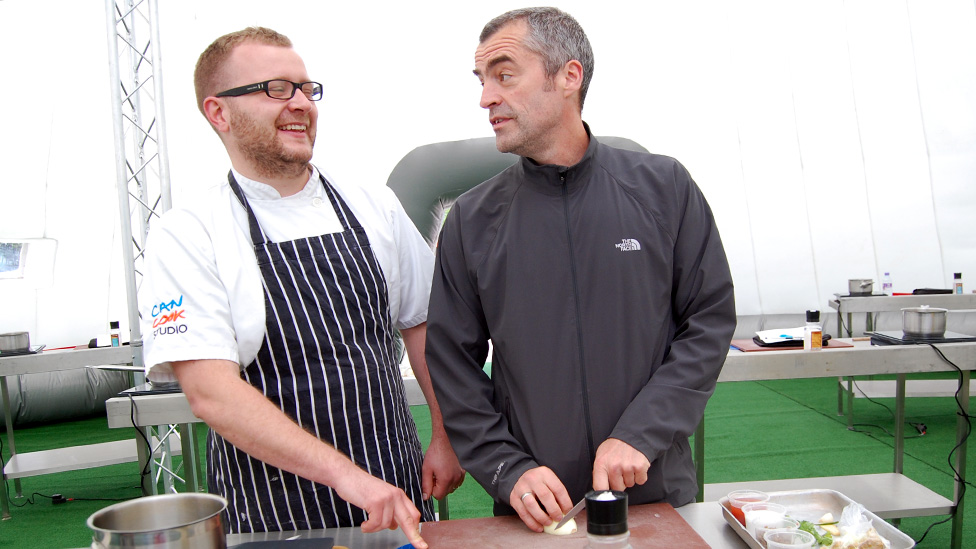
Credit: BBC
A Different Food Organization
SN: When you finally realized this was a problem you needed to take in your own hands, how did you go about organizing Can Cook?
RD: Our approach is focused on quality over quantity. We said early on, if we were to have the impact we thought necessary, we would have to concentrate on our strengths and devise a model that was always good food first. We would create nutritious meals that were based on people’s everyday meal choices, and we would look to distribute those meals free of charge. In addition, we tried to arrange partnerships with the larger food aid charities – sadly, to no avail. When the charities told us that good food was not part of their food aid plans, we decided to campaign and establish the good food change we knew people deserved. Our food supply is growing, and our food aid model is growing, but sadly, our campaigning continues and will continue, as long as the larger food aid charities insist on supplying hungry people only processed food and feeding people badly.
SN: Can you explain how Can Cook differs in philosophy and approach from most charitable food organizations in the UK?
RD: What is concerning is most organisations working in food aid have no food expertise at all. In fact, the two largest food aid charities in the UK have no food pedigree. For them, it’s about supply, franchise, and logistics. Their concern is food quantity over food quality. In fact, the food aid parcel given out by these charities expects people to eat products, not meals, and those products are very high in sugar, salt, lack fiber, and are devoid of vitamin D. This approach serves only to reinforce the poorest of food habits.
We are a food organisation first, and being food first dictates our food aid responses. Working with the issues and consequences of food poverty, it has always been apparent to us that hungry people require the best food possible.
We all organise our lives around the punctuation of meals times…breakfast-lunch-dinner. Now imagine if the option of meal times was removed and the only option available was to search for where the next meal was to come from, never knowing what that meal was going to be. It is a situation that removes the structure from a person’s life, and often chaos takes over. And all the time society expects people in their chaos to move on – for most, it’s just not possible. We are interested in helping prevent the chaos and protecting the structure, by providing fresh meals and a food aid parcel that can be easily cooked as meals – feeding people for up to 5 days.
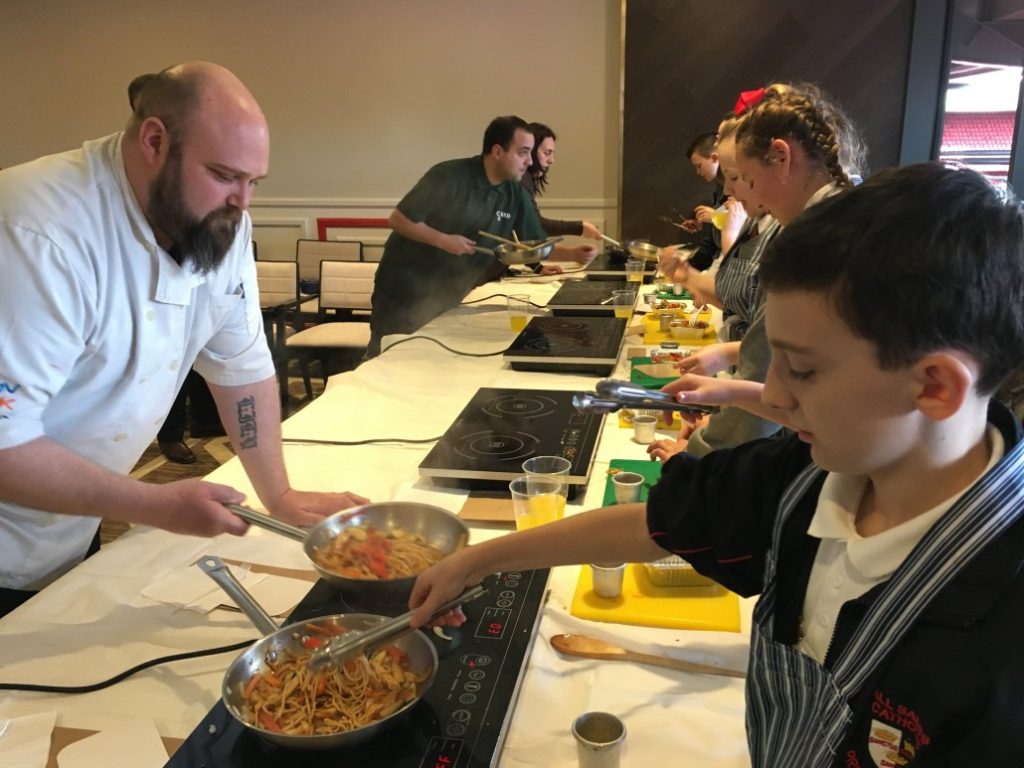
Credit: Can Cook
SN: On average, how many people do you service in a day? How much food does Can Cook produce in a day?
RD: Our model is about paid employment– if we were to work with a volunteer workforce, we could double our output. Therefore, a current normal working-week for us is 3500 meals. When we are in campaign mode, the number rises to 5000. We have exciting plans for 2019, which will see our numbers double and new jobs created.
Beliefs and Business
SN: As “an absolute, die-hard socialist,” what would you say are some misconceptions that come with the term, and how does it affect your business?
RD: The biggest misconception if you’re a socialist is, you can’t be interested in business, and if you run a socially motivated organisation, you will always be looking for free handouts. This couldn’t be further from my truth. Socialism, to me, is about fairness and equality. Where most social need is concerned, handouts and charity go hand-in-hand and are rarely ever fair or equal. So instead of handouts, social trading is required, if social need is to be pushed back.
My firm belief is that charity has a role in preventing social need on a small scale, but when it grows and the size of charities become that of some medium sized businesses, charity can become a big part of the problem.
To overcome this, society requires social business— businesses that are established out of need or market dysfunction— if you like— and in operation, trade, pay everyone a fair wage, pay suppliers on time and are always able to compete in their respective markets. It’s about establishing a fair value throughout the model and making sure those who are in need get the best service possible.
It can be done, but it requires investors who understand social motives, and it requires philanthropists to shift from the charity/grant model into a model that socially invests and is about fair trade, good profit, scale, and achieving significant social impact. Right now, social investors are few in number and philanthropy still favours charity and this affects how we run our business. If it was different, we would be in a position to scale and scale quickly.
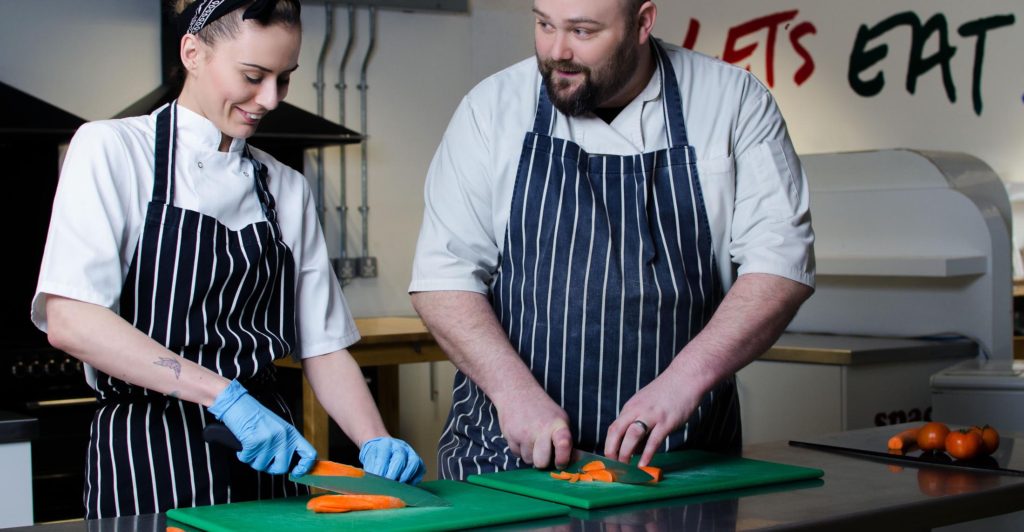
Credit: Can Cook
SN: What would you say is the difference between “food poverty” and other forms of poverty?
RD: The food poverty definition we use is…“People not having access to good fresh food by choice.”
Many in the poverty movement like to distort messages by claiming food poverty is a result of many other bigger contributory things such as lack of jobs or enough income, which of course it is. And, to solve food poverty you must solve the bigger problems first…which of course you don’t.
To explain and without being over simplistic— food poverty is the poverty of food – meaning a person has limited or no food options available to them. However, if a hungry person gets access to good food, then they are no longer in food poverty. This does not mean they are out of poverty, but with a supply of good food, they are certainly out of food poverty.
Quality Food, Quality Life
SN: Your mission isn’t just about feeding the poor, but feeding them good food. What hurdles have you needed to jump to fulfill this mission, instead of just handing out pre-packaged chips and sandwiches?
RD: Our approach is out of sync with the current food aid system, so there are many hurdles. We are seen as an outlier, often a dissenter, because of our good food model. The wider food aid movement claims our approach is not practical and unable to feed hungry people at scale. Yet our model, if widely adopted, is practical and can feed everyone. However, it does not conform to recycling tons of unwanted processed goods that are of no use to the health and hunger of people, but instead are being distributed because big business and big charity have found a use for it. The poor-food-for-poor-people-big-charity-model does not offer hungry people the sort of food or dignity they require if their circumstances are to change— our model does.
SN: How far are you hoping to expand Can Cook? Have you considered starting a branch in the United States?
RD: We think we have model that can offer a solution in any town/city. In our model, schools have an important part to play, and in the USA schools are much bigger in size than here in the UK. So, would we consider the USA…definitely! And would our model work in the USA…no doubt!
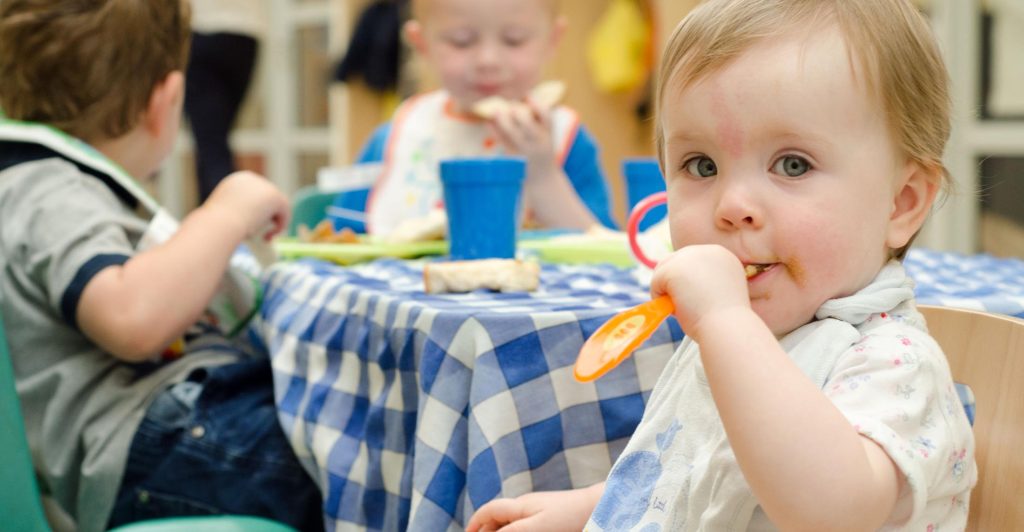
Credit: Can Cook
SN: Tell us about one fulfilling moment you experienced with Can Cook.
RD: There are many…the ones that stand out are those that change people’s lives. I’ll provide you with two short examples because the contrast is important.
From our cookery training, we met a teenager getting into a great deal of trouble with a threat of prison. We worked with him as part of our cookery competition called The School Sessions. He excelled and produced a restaurant quality dessert after only two full lessons, and the judges chose his work as the stand out session. He chose catering as career and still reflects on the sessions with us as his “game-changer.”
From our food production, this summer, we fed children during their 6-week school holiday period (18,000 meals in total). At the close of the scheme, the staff of the holiday scheme reported children being more focused, less disruptive, and there being very few examples of unrest compared to previous years— the only change was the supply of our fresh meals. This is why we do what we do.
